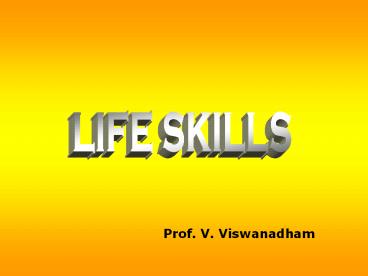20100528_Life Skills - PowerPoint PPT Presentation
Title:
20100528_Life Skills
Description:
This presentation was prepared for the students of the Foundation Programme of the Company Secretaries. – PowerPoint PPT presentation
Number of Views:1527
Title: 20100528_Life Skills
1
LIFE SKILLS
Prof. V. Viswanadham
2
Life Skills
- The abilities
- for adaptive and positive behaviour
- that enable individuals
- to deal effectively
- with the demands and challenges
- of everyday life
- - World Health Organization (WHO)
3
- A behaviour change or
- behaviour development approach designed to
address - a balance of three areas
- Knowledge,
- Skills and
- Attitude
4
- Life skills
- are essentially
- those abilities that
- help promote mental well-being
- and competence
- in young people
- as they face the realities of life
5
- In short,
- it empowers young people
- to take positive actions
- to protect themselves and
- to promote health and
- positive social relationships
- for successful professional career and wholesome
life.
6
WITH LIFE SKILLS ONE IS ABLE TO
- Explore alternatives,
- Weigh pros and cons, and
- Make rational decisions in solving each problem,
or issue as it arises. - It also entails being able to establish
productive interpersonal relationships with
others
7
Life Skills Spectrum
8
CORE LIFE SKILLS STRATEGIES
- UNICEF, UNESCO and WHO list ten(10) core life
skills strategies - 01. Communication skill,
- 02. Problem solving,
- 03. Critical thinking,
- 04. Creative thinking,
- 05. Decision-making,
- 06. Interpersonal skills,
- 07. Self-awareness building skills,
- 08. Empathy,
- 09. Coping with stress, and
- 10. Coping with emotions
Now - let's group
9
Learning to know Cognitive abilities Decision
making and problem solving skills Critical
thinking skills Learning to be Personal
abilities Skills for increasing internal locus
of control Skills for managing feelings Skills
for managing stress
10
Learning to live together Interpersonal
abilities Interpersonal communication
skills Negotiation and refusal
skills Empathy Cooperation and teamwork Advocacy
skills
Now - let's get into the details
11
- Learning to know Cognitive abilities
- Decision making and problem solving skills
- Information gathering skills
- Evaluating future consequences of
- present actions for self and others
- Determining alternative solutions to problems
- Skills of analysis regarding the influence of
- values and attitudes of
- self and others on motivation
12
Learning to know Cognitive abilities -
continued Critical thinking skills Analyzing
peer and media influences Analyzing attitudes,
values, social norms and beliefs and factors
affecting these Identifying relevant
information and information sources
13
Learning to be Personal abilities Skills for
increasing internal locus of control
Self-esteem and confidence-building skills
Self-awareness skills including awareness of
rights, influences, values, attitudes,
strengths and weaknesses Goal-setting skills
Self-evaluation, self-assessment, and
self-monitoring skills
14
Skills for managing feelings Anger
management Dealing with grief and anxiety
Coping skills for dealing with loss, abuse,
trauma
Learning to be Personal abilities -
continued
15
Skills for managing stress Time management
Positive thinking Relaxation techniques
Learning to be Personal abilities -
continued
16
Learning to live together Interpersonal
abilities Interpersonal communication skills
Verbal and nonverbal communication Active
listening Expressing feelings giving
feedback (without blaming) and receiving
feedback
17
Learning to live together Interpersonal
abilities - continued
Negotiation and refusal skills Negotiation and
conflict management Assertiveness skills
Refusal skills
18
Learning to live together Interpersonal
abilities - continued
Empathy Ability to listen to and understand
another's needs and circumstances and express
that understanding
19
Learning to live together Interpersonal
abilities - continued
Cooperation and teamwork Expressing respect for
others' contributions and different styles
Assessing one's own abilities and contributing
to the group
20
Learning to live together Interpersonal
abilities - continued
Advocacy skills Skills of influence and
persuasion Networking and motivation skills
21
Each of the skills can be detailed further for
example Communication Skills - includes
- Verbal and Non-verbal communication
- Listening and giving feedback
- Culture and language specific skills like
Phonetics, Accent training, dressing sense, etc - Presentation skills
- Public speaking skills
- Negotiation and refusal skills
- Assertiveness skills to manage conflicts, etc
Getting worried ! Makeup your Mind.
22
When you believe something is impossible, your
mind goes to work for you to prove why. But,
when you believe, really believe, something can
be done, your mind goes to work for you and
help to find the ways to do it.
23
- Better Self-awareness leads to
- better self-management
Self-awareness
Self-management
Self-esteem
Self-confidence
24
Be the best
25
For the sake of record
As on 28th May 2010 -
Prof. V. Viswanadham has uploaded live recordings
of more than 280 of his speeches to
www.archive.org. Communication Skills - has
been downloaded, 375 times. More than 150 Power
Point Presentations, can be freely viewed at
www.scribd.com So far 51,850 have viewed
13,380 have downloaded. www.slideshare.net/viswan
adham - One of the presentations, titled
Communication Skills, has been viewed 6,945
times, and downloaded 1,024 times. Thank you
dear friends for helping me to reach many more.
26
In case YOU liked this speech and
presentation for listening to more speeches
and for viewing more presentations, Please
Visit
Visit http//www.archive.org and Search for
Prof. V. Viswanadham please download
and then kindly listen.
thank you
27
In case YOU liked this presentation for viewing
more presentations, on various topics, please
download and then kindly view to appreciate
better the animation aspects. Please Visit
Please visit www.scribd.com and search for
Viswam.vangapally4581 and / or www.slideshare.net/
viswanadham
In case YOU want to give some feedback / contact
me Viswam. vangapally_at_gmail.com Prof. V.
Viswanadham 040 2722 3383
A BIG THANK YOU FOR YOUR PATIENT LISTENING
28
Thanks again































